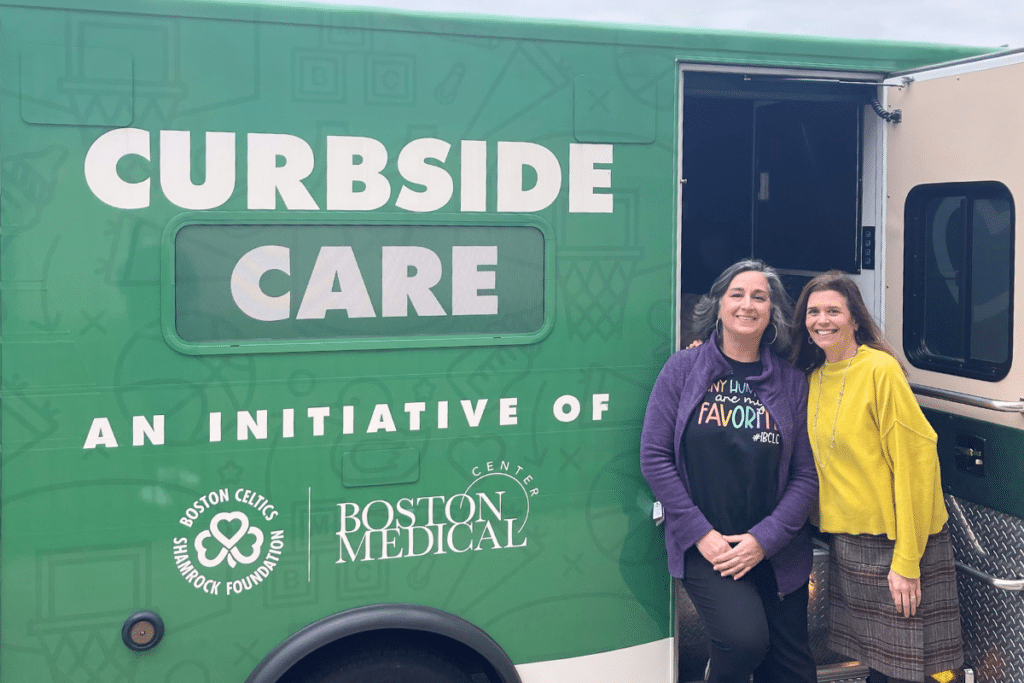
A pediatric Occupational Therapist and Lactation Consultant, we were thrilled to have Renee Gomis Ferraro, MS, IBCLC, join our board of directors in 2024.
Renee has a longstanding commitment to underserved families. She most recently worked as a lactation consultant in Boston Medical Center’s (BMC) NICU. Here she championed the use of donor milk for premature and medically fragile infants. Currently, she is a member of BMC’s innovative Curbside Care Post Partum Mobile Unit which provides maternal and child health services to families right outside their home.
Seeking to improve breastfeeding rates among families who disproportionately receive less postpartum care and lactation support, Mothers’ Milk Bank Northeast announced a partnership with Boston Medical Center’s Curbside Care program earlier this year. Funded by Massachusetts Attorney General Campbell’s Maternal Health Equity grant, this partnership aims to reduce maternal health disparities by increasing equitable access to donor milk at no cost to eligible patients.
The use of donor milk as a supplement, rather than formula, has been linked to higher breastfeeding rates. Successful breastfeeding results in health benefits for children including lower rates of certain cancers, SIDS, asthma, diabetes, and improved neurodevelopmental outcomes. Meanwhile, women who breastfeed have lower rates of certain cancers, heart disease, diabetes, and obesity.
You’ve worked in several family focused settings with an emphasis on providing care for underserved populations. Can you tell us a bit more about this?
I’ve always loved working with families and found my time in an Early Intervention Program especially rewarding. Many of the families we worked with faced significant socio-economic and language barriers. Often, having a baby with a special need or medical diagnosis contributed to the challenges they faced. Spending years providing care to infants within their own homes and family systems gave me a unique opportunity to see them grow and gain developmental skills. It’s an incredibly special feeling.
How does your background in occupational therapy inform your work today?
Occupational Therapy focuses on helping babies develop motor skills so they can grow and learn from their environment. Having worked with infants and toddlers for many years as an Occupational Therapist (OT), training as a lactation consultant felt like a natural progression. OT’s have advanced training in oral anatomy and oral motor skills but also take into account other factors (physiological, cultural and environmental included) that impact breastfeeding. For me, it’s a perfect fit.
You’ve long championed the use of pasteurized human donor milk. Having worked in the NICU, can you elaborate on the value of this medical resource?
Babies who are born prematurely are at risk for many complications including infection. Uniquely nourishing, human milk protects the health of newborns and their fragile digestive systems. Whether due to illness or a still developing milk supply, there are many reasons why mom might be unable to provide milk for her baby in those earliest days. This is where donor milk comes in. Easy to digest, it strengthens baby’s immune system. In short, donor milk is medicine for our fragile babies.
We believe every baby deserves the chance to thrive. Can you talk about the importance of providing equitable access to donor milk?
Many mothers who end up delivering premature or sick babies are from our underserved and marginalized communities. Chronic exposure to excessive social/cultural stressors have a physiologic cost that contributes to pregnancy complications. Safe and equitable access to human donor milk helps reduce the disparities and is an optimal nutritional start and foundation for lifelong health.
What is the one thing you wish everyone knew or understood about donor milk?
That premature babies are extremely vulnerable and need human milk to help protect them. I also wish everyone could understand that the milk donated to an accredited non-profit milk bank is tested and pasteurized for safety. In a hospital setting we can only rely on milk from a milk bank that ensures safety standards such as Mothers’ Milk Bank Northeast. This is what makes donating to an accredited non-profit milk bank so powerful – here, this gift can save lives.
We’re thrilled to have you serve on our Board of Directors. What inspired you to join us?
I first learned about donor milk while training to become an IBCLC. But once I started working in the NICU, I really came to understand its importance – especially in relation to supporting premature and medically fragile babies. Then, the milk bank came to Boston Medical Center’s NICU for a presentation. I was so impressed with the organization and the amount of work dedicated to providing safe, secure food for babies in need. I always took it for granted when I opened the freezer and there was milk for our little patients. In reality, there’s a large group of people working hard to make that happen. I’m so proud to be part of this amazing organization.
Currently, a member of BMC’s innovative Curbside Care Mobile Unit. What does an average day involve and how has the reception been so far?
Curbside Care is a health equity initiative between Boston Medical Center and the Boston Celtics Shamrock Foundation. It is a mobile unit that provides comprehensive care to mothers and infants during the first 6 weeks of life. Even better, it all happens right outside their home. By eliminating hurdles the need for transportation and childcare can create, Curbside Care aims to expand access to care, improve health outcomes for mothers and babies, and increase breastfeeding duration.
We have a pediatric provider, a nurse midwife, a lactation consultant and a community wellness advocate on the unit. In the morning, our pediatric provider and midwife make sure mother and baby are healing and thriving. In the afternoon, breastfeeding support and community wellness services take over. Patients also receive necessities such as food, diapers, and hygiene products. They’re also assisted with identifying various resources within their communities. Supporting families during this most special time is wonderful. In our first year, 500 moms and babies were seen – I’m lucky to be working with such a great team.
Did you know that just one ounce of milk can provide up to three life saving and supporting meals for some of our tiniest and most medically fragile babies? To learn more about becoming a milk donor please click here. Interested in helping us spread the word? We’d love that! Please feel free to share this post on Facebook or Instagram.








